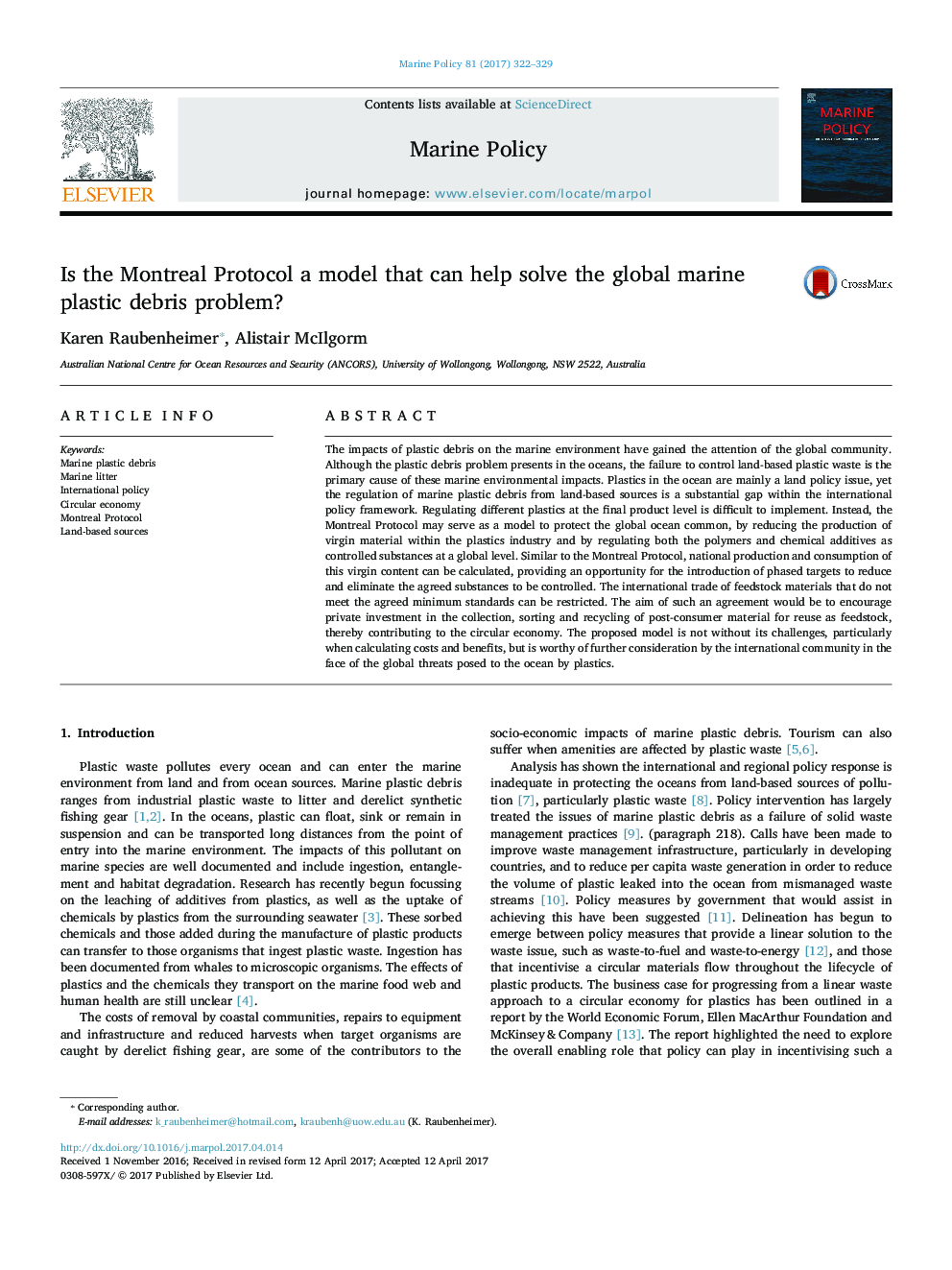| کد مقاله | کد نشریه | سال انتشار | مقاله انگلیسی | نسخه تمام متن |
|---|---|---|---|---|
| 5118043 | 1485498 | 2017 | 8 صفحه PDF | دانلود رایگان |
عنوان انگلیسی مقاله ISI
Is the Montreal Protocol a model that can help solve the global marine plastic debris problem?
ترجمه فارسی عنوان
آیا پروتکل مونترال یک مدل است که می تواند به حل مسئله بقایای پلاستیک دریایی جهانی کمک کند؟
دانلود مقاله + سفارش ترجمه
دانلود مقاله ISI انگلیسی
رایگان برای ایرانیان
کلمات کلیدی
مخازن پلاستیکی دریایی، بستر دریایی، سیاست بین المللی، اقتصاد مدرن، پروتکل مونترال، منابع زمینی،
ترجمه چکیده
تأثیر بقایای پلاستیکی در محیط دریایی، توجه جامعه جهانی را به خود جلب کرده است. اگر چه مشکل بقایای پلاستیک در اقیانوس ها ارائه می شود، عدم کنترل زباله های پلاستیکی زمینی علت اصلی این اثرات زیست محیطی دریایی است. پلاستیک در اقیانوس عمدتا مسئله سیاست زمین است، با این حال مقررات تخریب پلاستیک دریایی از منابع زمینی شکاف قابل توجهی در چارچوب سیاست بین المللی است. تنظیم پلاستیک های مختلف در سطح محصول نهایی برای اجرای سخت است. در عوض، پروتکل مونترال ممکن است به عنوان یک مدل برای محافظت از اقیانوس های جهانی مشترک، با کاهش تولید مواد با ارزش در صنعت پلاستیک و تنظیم پلیمر و مواد افزودنی شیمیایی به عنوان مواد کنترل شده در سطح جهانی. همانند پروتکل مونترال، تولید و مصرف ملی این محتوای باکره می تواند محاسبه شود و فرصتی برای معرفی اهداف مرحله ای به منظور کاهش و حذف مواد مورد توافق مورد نظر قرار گیرد. تجارت بین المللی مواد اولیه که استانداردهای مورد توافق را برآورده نمی کنند، محدود می شود. هدف از چنین توافقی، تشویق سرمایه گذاری خصوصی در جمع آوری، مرتب سازی و بازیافت مواد پس از مصرف مواد برای استفاده مجدد به عنوان مواد اولیه خواهد بود و در نتیجه به اقتصاد دایره ای کمک می کند. مدل پیشنهادی بدون چالش های آن، به ویژه هنگام محاسبه هزینه ها و منافع، نیست، بلکه مورد توجه جامعه جهانی در برابر تهدیدهای جهانی قرار گرفته توسط اقیانوس های پلاستیک است.
موضوعات مرتبط
مهندسی و علوم پایه
سایر رشته های مهندسی
مهندسی دریا (اقیانوس)
چکیده انگلیسی
The impacts of plastic debris on the marine environment have gained the attention of the global community. Although the plastic debris problem presents in the oceans, the failure to control land-based plastic waste is the primary cause of these marine environmental impacts. Plastics in the ocean are mainly a land policy issue, yet the regulation of marine plastic debris from land-based sources is a substantial gap within the international policy framework. Regulating different plastics at the final product level is difficult to implement. Instead, the Montreal Protocol may serve as a model to protect the global ocean common, by reducing the production of virgin material within the plastics industry and by regulating both the polymers and chemical additives as controlled substances at a global level. Similar to the Montreal Protocol, national production and consumption of this virgin content can be calculated, providing an opportunity for the introduction of phased targets to reduce and eliminate the agreed substances to be controlled. The international trade of feedstock materials that do not meet the agreed minimum standards can be restricted. The aim of such an agreement would be to encourage private investment in the collection, sorting and recycling of post-consumer material for reuse as feedstock, thereby contributing to the circular economy. The proposed model is not without its challenges, particularly when calculating costs and benefits, but is worthy of further consideration by the international community in the face of the global threats posed to the ocean by plastics.
ناشر
Database: Elsevier - ScienceDirect (ساینس دایرکت)
Journal: Marine Policy - Volume 81, July 2017, Pages 322-329
Journal: Marine Policy - Volume 81, July 2017, Pages 322-329
نویسندگان
Karen Raubenheimer, Alistair McIlgorm,
